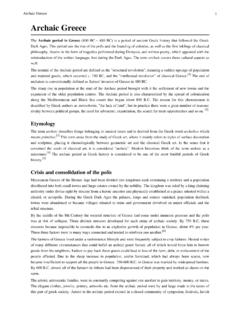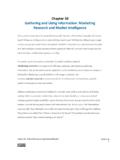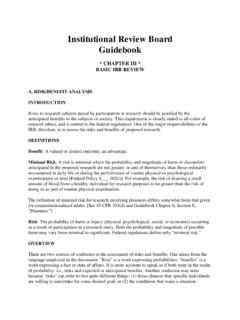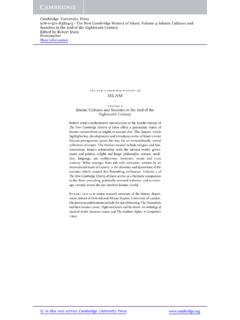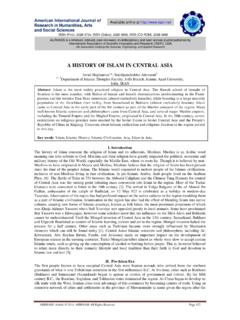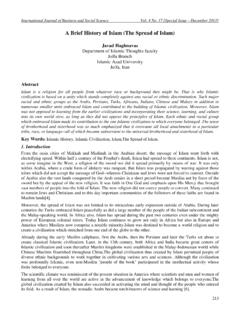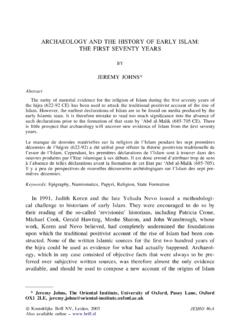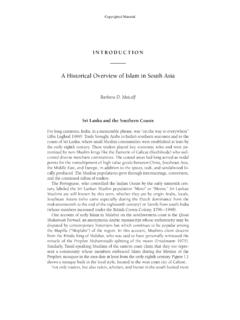Transcription of History of Islam/Early Islam - Saylor Academy
1 History of Islam / early Islam1 History of Islam / early IslamThe History of Islam begins with Muhammad * (c. April 20, 570 - June 8, 632 AD)[1] who was an Arabianreligious and political leader who Muslims believe to be the last prophet of Allah (God). He is a descendent ofIshmael, a son of Abraham, he is considered the most important person in the religion of * was born about April 20 570 AD in he was about forty years old, he received arevelation from the God and was then commanded to preach to the people the error of their pagan like ways.
2 Thereligion that Muhammad * preached was based on the Abrahamic concept of one God and was strictlymonotheistic in nature. It accepted older biblical prophets and kings as prophets as well. To escape the persecutionsof the Meccans Muhammad * migrated to the nearby city of Medina in 622. From there through skilfuldiplomacy he subdued almost the entire Arab nation before his death in Muhammad * passed away, the Muslim leadership was assumed by Abu Bakr. He was followed by Umar,Uthman ibn Affan and then Ali. These four are called the Rashidun caliphs which means The Righteous word caliph means religious and spiritual leader.
3 Under these caliphs Islam became one of the most importantreligions of the middle East. Administrative offices of the Muslim nation were established. Under Umar more thentwo thirds of the Eastern Roman Empire was conquered by the Muslims. Umar also started the Muslim first civil war in Islam , also known as the First Fitna broke out in Islam during the rule of the fourth caliph Aliand lasted throughout his caliphate. The third caliph Uthman ibn Affan had been murdered by rebel Muslim groupswho had political motives. After Ali took over, the most important problem he faced was that of punishing thoseresponsible for murder.
4 However many people felt that before accepting the position of the caliph, Ali should havefocussed his attention on finding and punishing the murderers. A group of people led by Muhammad's wife Aisha,her brothers in law Talhah and Zubair ibn al-Awam refused to recognize Ali's caliphate. They instead raised an armywhich met Ali's army at Basra in Iraq, originally for the purposes of negotiations. In the night, some fighting brokeout, probably out of confusion or due to rebel groups who were involved in the infamous murder. This led to theBattle of Bassorah (also known as Battle of the Camel) in which Ali's party emerged victorious.
5 Aisha was escortedback to Medina honorably after the battle by battle however did not entirely finish the tension in the Muslim empire. Ali was soon challenged by Muawiyah,the governor of the Muslim provinces of Syria. He too raised the issue of punishing Uthman's murderers and refusedto acknowledge Ali as caliph until the issue had been solved. Muawiyah was a kinsman of Uthman and his armypledged to bring to justice the murderers and those who sheltered them. People who are sheltering the murderers wasa reference to Ali and his followers. Accordingly, the two groups met and fought a battle, called the Battle of battle ended in a draw and so both groups decided on arbitration which also didn't lead to any concrete group of Muslims, The Kharijites who had previously been with Ali, meanwhile rejected him because theyfelt that he was not following true Islam and conducting business over the caliphate as if it were his own the following years Ali's governors could not prevent his losing provinces to Muawiyah who increased hisstrength by further expanding his army.
6 Ali had shifted the capital of the caliphate from Medina to Kufa in 656. Hewas killed by a Kharijite assassin in 661. In respect to the prophet Muhhamad (Sallallahu alayhi wa sallam).Article Sources and Contributors2 Article Sources and ContributorsHistory of Islam / early Islam Source: Contributors: AB7 rule, Adrignola, Jguk, Jmoinian, RCWhite364, Shahab, VSimonian, Whiteknight,Yarabbhaiteraehsaan, 7 anonymous editsLicenseCreative Commons Attribution-Share Alike Unportedhttp:/ / creativecommons. org/ licenses/ by-sa/ 3. 0/
